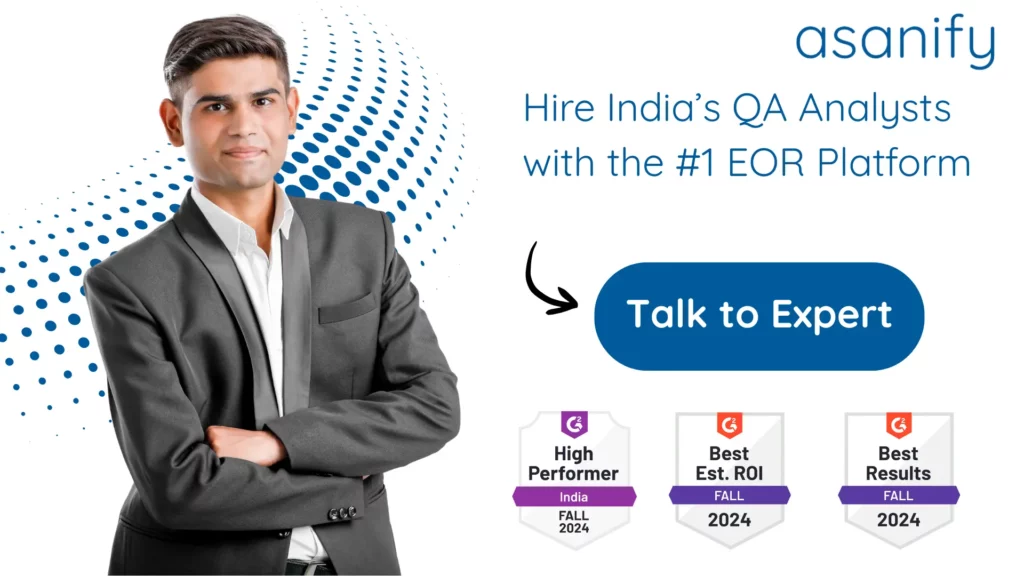As software product cycles accelerate and user expectations rise, quality assurance (QA) is no longer optional—it has become a foundational element of successful product development. In 2025, global engineering and product teams are increasingly turning to India to find top-tier QA Analysts who can safeguard product quality while optimizing operational costs. With a vast pool of trained professionals, an expanding startup ecosystem, and a track record of success in software testing, India has emerged as the go-to destination for sourcing reliable and scalable QA talent. This guide covers everything global teams need to know about successfully hiring QA Analysts from India.
Table of Contents
- Why Hire QA Analysts from India
- Who Should Consider Hiring QA Analysts in India
- Key Skills to Look for in QA Analysts
- QA Analyst Roles and Use Cases
- Hiring Models to Choose From
- Step-by-Step Guide to Hiring QA Analysts in India
- Salary Benchmarks for QA Analysts in India
- Legal and Compliance Considerations
- Common Challenges in Hiring QA Analysts Remotely
- Best Practices for Managing Remote QA Analysts
- Why Use Asanify to Hire QA Analysts in India
- Conclusion
- FAQs
Why Hire QA Analysts from India
India continues to be a global IT powerhouse, producing over 1.5 million engineering graduates annually. A significant percentage of these professionals specialize in software testing, both in manual and automation domains, ensuring a continuous and competitive pipeline of QA talent. The country offers cost-effective solutions, high English language proficiency, and a widespread ability to work across global time zones—making it ideal for companies looking to establish a 24/7 QA workflow. Moreover, Indian QA Analysts are renowned for their analytical skills, attention to detail, domain expertise, and familiarity with agile and DevOps methodologies. This makes them highly adaptable to the quality demands of modern software environments.
Who Should Consider Hiring QA Analysts in India
Whether you’re a startup racing to deliver your MVP, a scaling SaaS company tightening your CI/CD loops, or an enterprise launching mission-critical applications, hiring QA Analysts from India can significantly enhance your software quality while reducing overhead. Teams that are planning to expand QA coverage, adopt automation testing practices, reduce bugs in production, or establish offshore test centers will find India an ideal market. Even small companies can benefit by tapping into this diverse and skilled talent pool through flexible hiring models such as remote contractors or Employer of Record solutions.
Key Skills to Look for in QA Analysts
Core Technical Skills
An effective QA Analyst should possess a solid understanding of the Software Testing Life Cycle (STLC), defect life cycle, requirements traceability, and backend validations using SQL. Familiarity with testing RESTful APIs, writing effective test cases, and knowledge of bug-tracking systems such as JIRA or Bugzilla are critical.
Automation & Tools Proficiency
QA professionals should be proficient in using industry-standard tools such as Selenium, Playwright, Cypress, TestNG, Postman, JMeter, and Jenkins. In addition, scripting capabilities in Java, Python, or JavaScript are often required for automation testing. Version control systems like Git and integration with CI/CD pipelines are becoming essential as organizations aim to streamline release cycles.
Domain & Industry Knowledge
Domain expertise adds significant value to QA teams. For instance, QA Analysts familiar with regulatory frameworks in healthcare or fintech can design more effective test plans. Understanding business workflows, compliance standards, and user personas within specific industries enables QA professionals to deliver more meaningful coverage and quality assurance.

QA Analyst Roles and Use Cases
Manual QA Analyst
Manual QA Analysts are responsible for exploratory, usability, and regression testing, ensuring a polished and intuitive end-user experience. They execute test cases manually, identify defects early in the cycle, and provide valuable feedback to the development team. This role is critical in projects where automated testing is not feasible or where user experience must be validated through human intuition.
Automation QA Engineer
These engineers develop automated test scripts that improve the speed, accuracy, and repeatability of the testing process. They are especially useful for regression, smoke, and performance testing. Automation QA Engineers play a pivotal role in continuous testing environments by integrating test automation into the CI/CD pipeline.
Performance & Security Testing Specialist
Performance testers simulate high-load scenarios to measure how applications behave under stress, helping teams identify and address bottlenecks. Security testing specialists focus on identifying vulnerabilities and ensuring that applications meet industry-standard security protocols. These roles are essential for enterprise-grade or customer-facing applications that handle sensitive data.
Hiring Models to Choose From
- Freelancers: Ideal for short-term, task-based needs but may lack accountability or continuity in long-term projects.
- In-house Hiring: Offers full control over the team but requires significant investment in local HR, payroll, and legal compliance.
- Staffing Agencies: Can quickly provide talent but often come with higher costs and varied quality.
- Employer of Record (EOR): The most flexible and compliant option. With Asanify as your EOR partner, you can hire full-time Indian QA talent without setting up a legal entity. Asanify manages everything from local labor laws and tax deductions to payroll and benefits.
Suggested Read: Hire Manual Testers in India: A 2025 Guide
Step-by-Step Guide to Hiring QA Analysts in India
- Define Role Requirements: Determine whether you need manual, automation, performance, or domain-specific QA professionals.
- Source Talent: Utilize job boards, LinkedIn, tech forums, or EOR platforms like Asanify with access to pre-vetted candidates.
- Screen Resumes: Shortlist candidates based on certifications, prior projects, and tool proficiency.
- Conduct Technical Assessments: Evaluate practical skills such as writing test scenarios, finding bugs in a test application, and API testing.
- Interview for Soft Skills: Assess communication, teamwork, problem-solving attitude, and ability to work in distributed teams.
- Make an Offer: Include detailed information on compensation, work expectations, KPIs, and growth opportunities.
- Onboard Remotely: Ensure access to testing tools, infrastructure, and documentation. Asanify helps facilitate a seamless onboarding experience with local HR support.
Salary Benchmarks for QA Analysts in India
| Role | Experience Level | Average Salary (INR/year) |
| Manual QA | 2-4 years | ₹8-12 Lakhs |
| Automation QA | 3-5 years | ₹12-18 Lakhs |
| Performance/Security Tester | 4-6 years | ₹15-22 Lakhs |
These salary ranges are indicative and may vary based on location (Tier-1 vs Tier-2 cities), industry, and technology stack. Automation testers and domain specialists often command a premium.

Legal and Compliance Considerations
Hiring employees in India involves adherence to multiple labor laws including the Shops and Establishment Act, Income Tax regulations, Provident Fund (PF), Employee State Insurance (ESI), and Professional Tax (PT). Employers must ensure that contracts are legally compliant and employee benefits are processed as per Indian law. Misclassifying contractors can lead to compliance risks and penalties. Using a trusted EOR platform like Asanify eliminates this risk by ensuring end-to-end compliance with all local employment regulations, including issuing offer letters, onboarding, monthly payroll processing, and benefits administration.
Common Challenges in Hiring QA Analysts Remotely
- Time Zone Coordination: Indian teams may need overlapping hours with U.S. or European counterparts to maintain communication flow.
- Communication Gaps: Differences in communication styles, especially when reporting issues or test results, can cause misunderstandings.
- Infrastructure Readiness: Providing secure access to staging environments and licenses for testing tools can be logistically challenging.
- Retention Risks: Due to high demand, experienced QA professionals may receive multiple offers, making it essential to offer competitive packages and meaningful work.
Best Practices for Managing Remote QA Analysts
- Set measurable goals and KPIs such as test coverage percentage, defect escape rate, and turnaround time for test cycles.
- Use collaboration and documentation tools like Confluence, TestRail, JIRA, and Slack to maintain clarity and transparency.
- Encourage participation in daily scrum calls and retrospectives to align with the agile workflow.
- Invest in upskilling through training, webinars, and QA certifications to maintain engagement and skill enhancement.
- Offer timely feedback, recognition, and incentives to boost morale and retention.

Why Use Asanify to Hire QA Analysts in India
Asanify is a trusted Employer of Record platform designed for global companies looking to expand into India without establishing a legal entity. Asanify offers access to pre-vetted QA talent, localized contracts, automated payroll, and full compliance with Indian labor laws. With Asanify handling HR, tax deductions, statutory benefits, and documentation, you can focus on scaling your QA efforts without administrative burdens. The platform also supports flexible engagement models—full-time, part-time, or project-based—allowing you to stay nimble as your QA needs evolve. Moreover, Asanify’s employee-centric approach ensures higher job satisfaction, better retention, and long-term collaboration.
Suggested Read: Hire Magento Developers in India: The Ultimate 2025 Guide
Conclusion
Hiring QA Analysts in India in 2025 is a strategic move for global product and engineering teams that aim to deliver high-quality software faster and more efficiently. India offers a deep, diverse, and experienced talent pool well-versed in both manual and automated testing methodologies. With the right hiring model and a reliable EOR partner like Asanify, you can confidently build and scale your QA function while remaining fully compliant with local laws. By leveraging Asanify’s expertise, infrastructure, and people-first approach, you can empower your QA team to become a critical pillar of your product development success.
FAQs
Manual QA: ₹10-15 LPA; Automation QA: ₹14-20 LPA depending on skillset and location.
Typically 2–4 weeks, thanks to Asanify’s curated talent network and automated onboarding.
Yes. Asanify’s EOR platform ensures end-to-end statutory compliance, including PF, PT, and ESI.
Absolutely. Flexible contracts and compliant offboarding are part of Asanify’s service.
Selenium, Postman, Playwright, JIRA, TestNG, TestRail, and Jenkins dominate the QA stack.
Asanify includes NDAs and IP-ownership clauses in locally compliant contracts, protecting your assets.
Not to be considered as tax, legal, financial or HR advice. Regulations change over time so please consult a lawyer, accountant or Labour Law expert for specific guidance.



